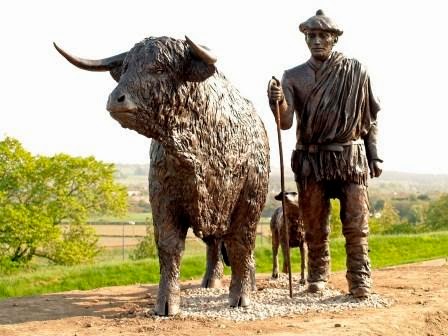The Two Drovers
The Two Drovers, by Sir Walter Scott
Some time ago, Scott's short story "The Two Drovers" was recommended to me as a way to step into the world of Waverley. I've read Ivanhoe, but so far my (miniscule) efforts to get interested in the Waverley novels have come to naught. I think this is partly because I thought I had to start with the first one, and really I should start with Rob Roy or Heart of Midlothian, something like that. Anyway, while I was looking for some Romantic stuff to read, I found "The Two Drovers" in that trusty old Norton anthology. It's also found in Chronicles of the Canongate with two other stories.
Two drovers are setting off with their herds from the border of Scotland. They'll walk to Lincolnshire to sell the cattle, and every night they'll rent fields along the way for pasturage. Robin Oig is a Highlander, well-regarded and of a proud family, and he is good friends with the younger Englishman Harry Wakefield. They often travel together. This time, though, there is an altercation, and their differing cultural temperaments prevent a reconciliation. Uh-oh.
Scott's idea in this story is to compare Highlanders, Lowlanders, and English--their differing traditions and cultures. I guess you'd call it cultural psychology? Both men are playing fair according to their lights, and yet one of them ends up dead. Just how does that happen?
I suppose Sir Walter Scott is the preeminent English Romantic novelist. England produced a lot of Romantic poets, but not so many novelists; they tended to go dark and Gothic. (I'd certainly call Gothic a sub-set of Romanticism, though, so here I mean non-Gothic Romanticism, and oh dear this paragraph is out of control.) Anyway, what with Ivanhoe and all those Scottish dramas, we've got some solid Romantic material here.
May will be Transcendentalism. I'm afraid I don't like Transcendentalism, but I will try.
Some time ago, Scott's short story "The Two Drovers" was recommended to me as a way to step into the world of Waverley. I've read Ivanhoe, but so far my (miniscule) efforts to get interested in the Waverley novels have come to naught. I think this is partly because I thought I had to start with the first one, and really I should start with Rob Roy or Heart of Midlothian, something like that. Anyway, while I was looking for some Romantic stuff to read, I found "The Two Drovers" in that trusty old Norton anthology. It's also found in Chronicles of the Canongate with two other stories.
 |
| Statue of a Scottish drover |
Two drovers are setting off with their herds from the border of Scotland. They'll walk to Lincolnshire to sell the cattle, and every night they'll rent fields along the way for pasturage. Robin Oig is a Highlander, well-regarded and of a proud family, and he is good friends with the younger Englishman Harry Wakefield. They often travel together. This time, though, there is an altercation, and their differing cultural temperaments prevent a reconciliation. Uh-oh.
Scott's idea in this story is to compare Highlanders, Lowlanders, and English--their differing traditions and cultures. I guess you'd call it cultural psychology? Both men are playing fair according to their lights, and yet one of them ends up dead. Just how does that happen?
I suppose Sir Walter Scott is the preeminent English Romantic novelist. England produced a lot of Romantic poets, but not so many novelists; they tended to go dark and Gothic. (I'd certainly call Gothic a sub-set of Romanticism, though, so here I mean non-Gothic Romanticism, and oh dear this paragraph is out of control.) Anyway, what with Ivanhoe and all those Scottish dramas, we've got some solid Romantic material here.
May will be Transcendentalism. I'm afraid I don't like Transcendentalism, but I will try.




Oh, wait. You thought the Waverley novels were a coherent series? Do people generally think the Waverley novels are a series, like it's a Scottish family saga or something? That would explain a lot.
ReplyDeleteMmmmm, I kind of figured that they were in some sort of chronological order, maybe had some character crossover (like, say, the Barsetshire novels or Discworld, not that anyone should read Discworld in strict order either). Are they not?
ReplyDeleteI didn't figure they'd be a family saga, though. I don't care for family sagas so that might have something to do with that. :)
No, not in any order, and no shared characters, not counting real people.
ReplyDeleteI mean, they are more or less set in the real world with real history, so they could be read in historical chronological order.
For a long time, Scott published the novels anonymously. They are the "Waverley novels" because they are "by the author of Waverley," Scott's first novel. That's it. "Waverley novel" = "novel by Walter Scott."
So Ivanhoe is a "Waverley novel."
There is one little hitch, because for his fourth novel Scott tried to re-anonymize to see what would happen. But everyone seemed to know it was by the same guy who wrote the Waverley books, whoever that was.
Oh, I see. Well, that clears that up I guess. :)
ReplyDelete